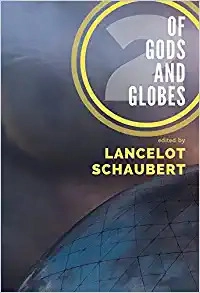Reading Level
What is the reading level of Of Gods and Globes II: A Cosmic Anthology ?
Analysing the books in the series, we estimate that the reading level of Of Gods and Globes II: A Cosmic Anthology is 5th and 6th grade.
Expert Readability Tests for
Of Gods and Globes II: A Cosmic Anthology
| Readability Test | Reading Level |
|---|---|
| Flesch Kincaid Scale | Grade 4 |
| SMOG Index | Grade 7 |
| Coleman Liau Index | Grade 6 |
| Dale Chall Readability Score | Grade 5 |
Reading Time
6 hrs 35 mins
How long to read Of Gods and Globes II: A Cosmic Anthology (2)?
The estimated word count of Of Gods and Globes II: A Cosmic Anthology (2) is 98,580 words.
A person reading at the average speed of 250 words/min, will finish the book in 6 hrs 35 mins. At a slower speed of 150 words/min, they will finish it in 10 hrs 58 mins. At a faster speed of 450 words/min, they will finish it in 3 hrs 40 mins.
| Of Gods and Globes II: A Cosmic Anthology (2) - 98,580 words | ||
|---|---|---|
| Reading Speed | Time to Read | |
| Slow | 150 words/min | 10 hrs 58 mins |
| Average | 250 words/min | 6 hrs 35 mins |
| Fast | 450 words/min | 3 hrs 40 mins |
- Authors
-
Lancelot SchaubertKaaron WarrenHoward Andrew Jones
More about Of Gods and Globes II: A Cosmic Anthology
98,580 words
Word Count
for Of Gods and Globes II: A Cosmic Anthology (2)
372 pages
Pages
10 hours and 36 minutes
Audiobook length
Description
PRAISE FOR THE AUTHORS :: “The entertainment value, and the hints of even greater revelations about the past of the iconic characters, and the world, make me very interested in how Howard Andrew Jones continues the story.” — TOR“Kaaron Warren proves that horror fiction can do more than just deliver disturbing imagery and violence. It can also compel us to confront our own assumptions and moral principles, to look outside the ordinary.” — LOCUS“Lancelot Schaubert’s words have an immediacy, a potency, an intimacy that grab the reader by the collar and say, ‘Listen, this is important!’ Probing the bones and gristle of humanity, Lancelot’s subjects challenge, but also offer insights into redemption if only we will stop and pay attention.” — Erika Robuck, bestselling author of Hemingway’s Girl ABOUT OGAG 2 :: Once more, my friends and colleagues and I have banded together to compose literature connecting astronomy and mythology: to write Of Gods & Globes II. Each one of us chose a name that connected astronomy (science fiction) and mythology (fantasy) such as “Janus” and wrote forth.But why on Earth — or off Earth — would we do such a thing?Well for starters, in his introduction to Bernard Silvestrus’s Cosmographia, Winthrop Wetherbee III (which, let’s be honest, is a doozy of a name but PERFECT for anyone destined to study and teach Latin) said that the thinkers of the classical and middle ages offered up: The idea the events of earthly life were governed and predetermined by the orderly disposition and activity of the heavenly bodies and could, in part, be foreknown through the careful analysis of celestial phenomena… Adelhard of Bath, in the De eodem et diverso, extols the power of the Arts to guide the soul in its earthly journey; they teach her to recognize her special relation to the rest of creation, to know the nature and intuit the divine pattern of the universe. For the soul’s basic affinity is with the divine rationes of things…Man, like the universe, lives and moves through the interplay of rational and irrational forces… which evokes preoccupation with the archetypal implications of myth and the themes of classic literature. We had such a successful launch last time that we decided to come together and write even more stories around this theme. We have continuations on a couple of new universes, hilarious new additions, heartbreaking horror stories, and flirtatious little romps.In the spirit of drawing on themes of myth and classic literature and of the tidal influence of the constellations, I rounded up sci-fi and fantasy writers to write about cosmic influence. The fantasy writers took a more mythological approach, speaking of the symbolic (or perhaps godly) Mercury and Mars and Neptune. The sci-fi writers tell you what it’s like to live on Jupiter and Uranus. All of them, though, speak of the influence of what one writer called “the music of the spheres.” These are stories Of Gods and Globes. They’re quite the ride: I enjoy each of these stories differently. They made me laugh and cry and chilled me to the bone with terror and one of them made me long for a home that… well for a home I don’t think I’ve ever been to before.Come fly with us. Let’s fly. Let’s fly away.Or, if you prefer, to appeal from Sinatra to Sinatra:Fly me to the moon Let me play among the stars. Let me see what spring is like On Jupiter and Mars… Fill my heart with song And let me sing forevermore You are all I long for All I worship and adoreLancelot Schaubert Brooklyn, New York 2020
